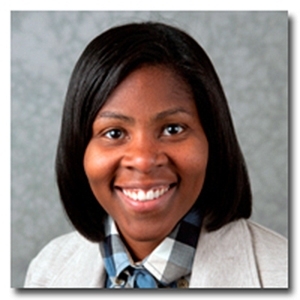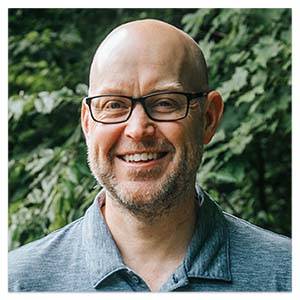English Matters - Fall 2021
A newsletter for faculty, students & alumni of the Grand Valley State University English Department
Notes from the Department Chair, Dr. Ashley Shannon
When I sat down to write this column, I found myself almost at a loss for what to say—which, as you probably know, is not usually a problem for English professors! Things have been so atypical since our last newsletter that returning to the normal rhythms of our year feels like re-learning a dance you knew a long time ago, but whose steps and sequences feel alien now.
Aside from the obvious issue of the pandemic, and its effect on our teaching and learning, as some of you may know, the English department has seen major changes over the past few years. Since 2019, twelve faculty have left the department—whether as retirees or in pursuit of new opportunities—and, with the advent of the new Pre-K-6 Education major, English will no longer be home to students in the Language Arts track once our current cohorts graduate. So, over the next few years, we will see a new English Department emerge. And I will be honest: as the chair of the department, this sometimes keeps me awake at night as I wonder what that department will look like. But, while I’ve always known this theoretically, what these past few years have taught me beyond a doubt is that English majors can rise to a challenge.
Since March 2020, when we shifted to remote learning, our students have inspired me. I have been heartened by and grateful for students going above and beyond to be successful in circumstances that none of us asked for and that were more than any of us should have had to deal with. I’ve seen students working in “essential worker” roles at the height of the pandemic coming to class exhausted and scared and giving 110% anyway. I’ve seen students extend extraordinary kindness to their professors when we’ve struggled to make sense of teaching in an online environment. I’ve seen students giving their time and talents to help tutor kids in grades K through 12, who have been set adrift by the pandemic even more than we have.
I’ve seen students who are overwhelmed, worried, and unsure of what the future holds navigate the everyday challenges of their schoolwork, multiplied by a factor of 10 at least, with tenacity, courage, and grace. And since the return to the classroom in August, I’ve seen—and been profoundly grateful for—students consistently being respectful of the community by responsibly following masking and vaccination guidelines.
I’ve also been inspired by my colleagues here in the department. Despite taking on extra teaching, English faculty have been creative and pedagogically ambitious, converting in-seat classes, assignments, and projects to versions of those things that function well in the virtual environment, even as they have juggled childcare and eldercare, and the wait and worry of the vaccine development process. Just as students have been generous with faculty, faculty have extended that same grace to students, offering both academic and emotional support as we all tried to find our way through this mess together.
I wish with all my heart that our majors had had the opportunity over the past year and a half to be regular college students, in regular classes, doing regular stuff with their friends and family. But since that wasn’t to be, I want our students and recent alumni to know that you have been an inspiration to your professors as we watch you rising to meet the challenges the pandemic has thrown at us. We see you. We know how tired and overwhelmed you were, and still are; we know at least some of what you’re contending with, not only at school but in your personal lives as well; and more than anything, we wish we had the ability to wave a magic wand and change things for you—for all of us.
Even though we can’t do that, there is good news: we know now that we have what it takes to live and work and learn through this moment. We also know that whatever the future holds, the hard work and dedication of our colleagues and, especially, our students, will ensure that English will continue to be a vital, exciting major, and that the faculty will consider themselves extraordinarily lucky to work with students who inspire us to do our best every single day.
[1518122388].jpg)
English Department Chair, Dr. Ashley Shannon
Student Spotlights
Undergraduate Students
Holly Bihlman - English Major, Language & Literature emphasis
Holly Bihlman, a current senior in the English Department with an emphasis on Language and Literature, is a great example of using her penchant for writing to follow her passions. “I started on the newspaper two years ago. I was a writer for those two years interviewing people, mostly coaches and athletes,” Holly Bihlman said during our recent discussion. These days, she fills the role of Sports Editor for the Grand Valley Lanthorn, where she assigns pieces among a staff of five while also creating content of her own. Holly and the Grand Valley Lanthorn’s Editor-in-Chief, Zach Goodrow, recently broke a story about the school’s football program that has caught many people’s attention. Speaking on preparing the story, Holly states, “It took us about four weeks to complete the investigation, and investigative journalism is something that I’ve never had to do before. Seeing that get a lot of clicks and views since it was published has been really cool.”
While sports writing is Holly’s passion, she was also able to use her talents at Grand Rapids Magazine, where she interned over the summer. “I interviewed business owners, people that were setting up events. It was cool learning how to write using the different styles of interviews,” says Holly.
Holly still finds time (however limited) for her classwork and helping other students via her role at the Fred Meijer Center for Writing & Michigan Authors. Holly found out early on that one of her strengths lay in writing and is sure to see this build, grow and expand post-graduation.
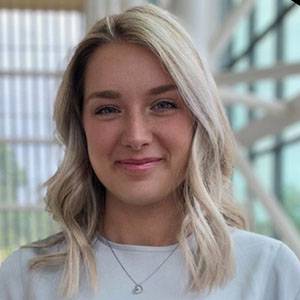
Holly Bihlman - English Major, Language & Literature
Rachel Velderman - English Major, Elementary Education emphasis
Rachel Velderman, a senior within the English Department focusing on Elementary Education, has been part of an exciting project called Teach4Justice.
When asked about Teach4Justice, Rachel shared the following:
“As my senior project for the Frederik Meijer Honors College, I had the privilege of co-writing the blog Teach4Justice with Anisa Everett [who is highlighted in our Alumni section below]. Anisa designed this blog out of a desire to critically examine childrens' literature primarily through a discussion of how language and imagery can either propagate or dismantle prejudices centered on race, class, gender, religion, and other factors of identity. Anisa and I have created a collection of text sets and additional resources for teachers that focus on antiracism, culturally sustaining pedagogies, and more. Having only brief exposure to the world of childrens' literature through a few classes at Grand Valley, I highly value this experience and strive to continue creating content as I finish up college, student teach in Fall 2022, and head into my career as an educator. I strive to provide my future students with a quality education that deepens their understanding of the world around them, creating a more inclusive society as a whole.”
Rachel, who grew up in a primarily white middle class community, explores stereotypes that readers and teachers may bring to children’s literature. She writes with an honesty that helps GV students to examine their own prejudices.
This rich and thoughtful blog is now part of the reading assignments for both ENG 309 and sections of ENG 302. Rachel and Anisa would appreciate your comments on the blog, but in order to do so, you will have to register your email address. Don’t worry—they won’t pass it on! See https://justicereading.wixsite.com/radicalreads.
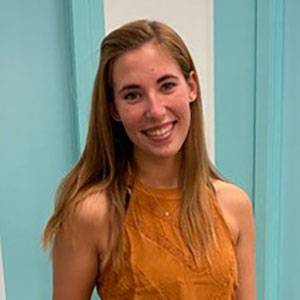
Rachel Velderman - English Major, Elementary Education emphasis
Erin Harshberger - English Major, Secondary Education emphasis
Erin Harshberger just accepted a position as a long-term substitute at Riverside Middle School, where she is currently student teaching. Erin was hired at the recommendation of her cooperating teacher, who has been impressed with her teaching of middle schoolers. “Erin is smart, hard-working, and dedicated to urban education,” said Robert Rozema, her supervising professor. “She is and will continue to be an outstanding teacher.”
When asked about the position, Erin wrote, “I'm excited and nervous about the position. It's a lot of responsibility to take on, but everyone from Riverside, as well as those from Grand Valley, have been completely supportive. All of my experience has been in Grand Rapids Public Schools and I love this community. My Grand Valley experience has taught me a lot of strategies for lesson planning and the logistical side of being prepared, which has helped me feel comfortable making this transition to focus on the classroom management piece. I also am endlessly grateful for the English Education cohort, as they have become my community and support through this process. Whether through group phone calls for lesson plans or just motivational texts throughout the day, they are the shoulders on which I am standing.”
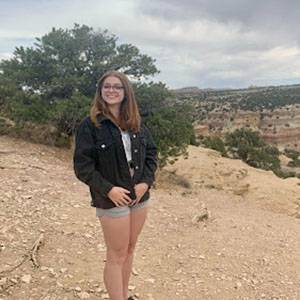
Erin Harshberger - English Major, Secondary Education emphasis
Ashtyn Fekete - International Relations Major; Applied Linguistics Minor
Ashtyn Fekete joined Grand Valley as a new Laker fresh out of high school and immediately jumped onto the study of language as a minor in applied linguistics with a major in international relations. She came with a head start in Japanese, which is not common for high schoolers from rural Michigan, and is planning a study-abroad in Japan in the near future while also taking classes in Chinese and East Asian cultures. She is inherently interested in comparing linguistic structures of English with those of Japanese and other languages and wonders how learners can successfully cross linguistic boundaries and become fluent speakers given the very different sound, lexical, and syntactic systems among them. Among her peers, Ashtyn stands out as having ambitious goals and knows early in her college career exactly what she wants to accomplish. Coming from a small town in Michigan, she is sure to embrace a much larger world with an open and inquisitive spirit and make a mark for herself in the endeavors she pursues.
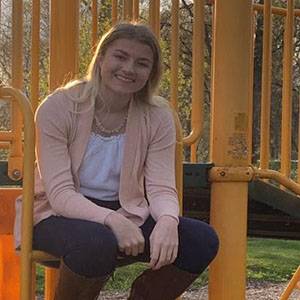
Ashtyn Fekete, AL minor
Six Word Stories
Life suspended, like dust in sunlight.
Kelsey Acker
English Major, Language & Literature
Learning to embrace change with warmth.
Austin Kienutske
English Major, Secondary Education
Thank you body, you sustained me.
Carol Miller
Writing Major
English Minor
Graduate Students
Anne Oxendine, Master of Arts in English student
Anne Oxendine, student in the MA ENG Program, submitted an abstract to the Society for the Study of Multi-Ethnic Literatures of the United States 2021 Call for Papers. The organizers accepted her proposal and on Friday, April 9, 2021, Anne presented, "Invisible Women and Hierarchy: Subverting Power Through Sex" on the panel, Resistance and Subversion in African American Literature. Speaking about her experience, Oxendine notes:
"Prior to submitting my abstract for consideration, I was skeptical of my or my paper’s readiness; but with encouragement from Dr. Johnson, I did indeed submit, tentatively hoping for, if not at all expecting, a window into the higher level sphere of academia. When my panel began I was nervous, but managed through reading my paper and those terrifying (though exciting) audience questions! I’m so thankful for Dr. Johnson’s encouragement, support, and guidance throughout the process & through my matriculation in the program, thus far!"
Not only was this her first conference presentation, but it was her first successful conference presentation -- the first of more to come! Congratulations, Anne! Well done!
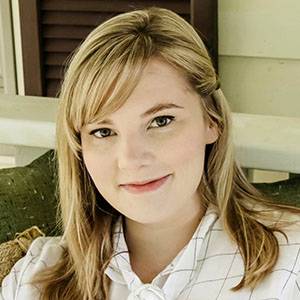
Anne Oxendine, Master of Arts in English
Haikus
No more complaining
This town is too small, I'm bored
A room's much smaller
Carol Miller
Writing Major
English Minor

Vice around my chest
Loosening by small degrees,
The new space buoyant.
Kelsey Acker
English Major, Language & Literature
Alumni Spotlights
Debra Kue, '20
Debra Kue is a busy woman. She is simultaneously pursuing a PhD while also in the process of publishing her first book, a collection of poetry, short fiction, and photography titled Mother Tongue. The book, according to Kue, “largely focuses and explores the multifaceted complexities of formulating an authentic identity within the first-generation Hmong-American experience, cultural disconnect, language barriers, sexuality, sensuality, the female body, family, and the search for home.”
Kue wanted to create something that can teach readers, something that encourages people to talk about and relate to struggles she has experienced firsthand. “It’s the process of letting yourself be vulnerable on the page and letting other people make assumptions,” Kue states in a recent interview with Goldyn Specs (you can watch the interview here). “A lot of my poetry is based on my own experiences. It’s having that little window open and saying ‘I felt these things, and they are personal to me. It is my story.’ And a lot of times I do have comments saying, ‘Do you really want to share that with everyone?’ And my answer is ‘Yes, I do,’ because I think it’s extremely important that these topics are raised because they are happening on an everyday basis.”
When asked to describe herself, Debra wrote:
I have just begun my first year as a PhD student within the English Department at Syracuse University where I will be specializing in 19th century American literature. My areas of interest and research are geared towards Emily Dickinson, as well as the identity politics of Transcendentalism through the works of Emerson, Thoreau, and Maragaret Fuller (among many others). My academic goal is to utilize the identity politics of Transcendentalism to create a conversation about identity, the use of literature, and the English language as a means for first-generation Hmong-Americans to create and establish existence.
Although I am attending another university, GVSU is and will always be my ground zero. Not only was I able to cultivate and hone my craft as a literary scholar and creative writer, through the teachings of astounding faculty members, but I have also become intensely aware of the world around me and how I want to contribute to it. During my time there, I received various awards for my writings - both critical and creative. In Spring 2016 I was awarded first place in the Oldenburg Writing Contest for Poetry, as well as first place in Personal Essay in Spring 2017. Also, in addition to graduating from GVSU's English M.A. program with distinction, I was also awarded the Graduate Dean's Citation Award for Outstanding Thesis Fall 2020 for my M.A. thesis, Emily Dickinson, the Tyrant, and the Daemon: A Critique of Societal Oppression, and the Significance of Artistic Truth.

Debra Kue, Master of Arts in English, '20
Anisa Douglas Everett, '20
Patricia Bloem, English department faculty writes...
Anisa Douglas Everett had just finished ENG 309, Teaching Literature to Children, when she asked if I would oversee her honors thesis on the topic of social justice literature for children. I was delighted with her idea. She wanted to write a blog for local teachers and pre-service teachers and hoped to spend her time carefully reading and commenting on the literature that she hoped they would consider teaching. Anisa, who later was the recipient of the University Award in the English BA program; the Distinguished ESL Minors Award, and the Distinguished Elementary Language Arts Award, identifies as biracial, as a community organizer, and as a teacher of refugees in the Baxter neighborhood, a community in Grand Rapids. She brings a strong social justice bent to her writing.
Here is what she says about herself:
Hi! My name is Anisa Everett, and I recently graduated from Grand Valley State University with a degree in English and elementary education, and a certification in teaching English as a second language. During my time at Grand Valley, I fell in love with education and found myself particularly drawn to examining the "big picture" challenges facing schools— especially those relating to equity and access for students from historically oppressed backgrounds. The Teach4Justice blog was born out of a desire to examine and address how the inequities of our education system manifest in literature, and to highlight books that are relevant and accessible to students and teachers from culturally or linguistically diverse backgrounds. Initially, the blog was just for my own personal reflection and record-keeping, but it has developed into a platform for colleagues— including my friend and co-author Rachel Velderman— and students to share their reflections on literature. I envision a future in which education systems reflect the hopes, needs, and cultural strengths of the communities they serve; the Teach4Justice blog is a small but evolving effort towards this aim.

Anisa Douglas Everett, '20
Dan Cope, '17
The national attention on voter registration appears to be a new phenomenon, however there are many community organizers who have been hard at work ensuring that all who are eligible have their voices counted year after year. Dan Cope, who graduated from GVSU’s MA English program, understands the importance of voter registration and does public service outside of her time as Affiliate Professor within IRIS (The Integrative, Religious, and Intercultural Studies Department). She has worked on voter registration in Grand Rapids and the surrounding areas since 2017 as a certified election inspector and acted as Deputy Clerk in Grand Rapids for the 2020 elections.
When asked why she was passionate about this work, she wrote, “A healthy community is an inclusive community, which only occurs when every member is empowered to participate. When we see and hear one another, we are more sensitive to the injustices that occur in our society and are better equipped to work together to address such problems.”
Read more about Dan Cope's work in Brooks College of Interdisciplinary Studies Newsletter here.
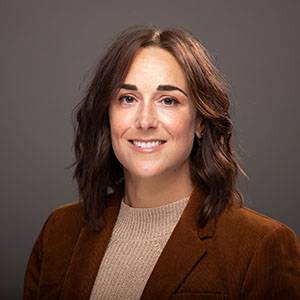
Dan Cope, '17
Faculty Features
David Álvarez, PhD
In late May, upon the recommendation of Dr. David Álvarez, the University of Gibraltar hosted the annual international congress of the Mediterranean Studies Association for the first time. Dr. Álvarez chaired a panel on Mediterranean borderlands for which two scholars, himself included, delivered papers on the work of Gibraltarian novelist and essayist, M.G. Sanchez. A member of GVSU's English Department since 1997, and a Gibraltarian himself, Dr. Álvarez is also a senior researcher at the University of Gibraltar's Centre for Gibraltarian and Mediterranean Studies.
Dan Brown, PhD
Professor Dan Brown, whose interests lie in second language acquisition and second language teaching methods, has recently written a chapter published in the book The Cambridge Handbook of Corrective Feedback in Second Language Learning and Teaching. Published in March 2021 by the Cambridge University Press, the book offers in-depth analysis and discussion of corrective feedback’s role in the learning and teaching of a foreign language. Professor Brown’s chapter, titled “Meta-Analysis and Research Synthesis,” discusses research synthesis in context with a focus on the meta-analysis approach to research synthesis in applied linguistics.
Brian Deyo, PhD
Professor Brian Deyo helped to form the new GVSU chapter of the American Association of University Professors (AAUP) in July 2020 with a small group of faculty united by concerns about the University administration’s responses to the challenges of the pandemic, most of which were related to a shared sense that the diverse perspectives and expertise of faculty across the disciplines and colleges had not been adequately consulted concerning major policies and initiatives impacting the quality of education the university is able to provide students. In addition to helping to form the new AAUP chapter, he has been working on its membership committee to help raise awareness on how it can “unite faculty voices to build a better university.” In a little over a year, the chapter’s membership has grown considerably, with close to fifty dues-paying members and over one hundred and fifty faculty active on its listserv. When asked what he has found most valuable and inspiring about the work of the chapter, he says that the opportunity to collaborate and form relationships with faculty across disciplines and colleges on the manifold challenges facing higher ed today has deepened his faith in the power of the core values and mission of liberal education.
Sherry Johnson, PhD
One of the year’s Martin Luther King Jr. commemoration week events, facilitated by our department’s own Dr. Sherry Johnson, was a panel discussion - "Looking for MLK: Doing Justice in West Michigan". The other participants included Joe Jones, Grand Rapids Commissioner, Ward 2 and former president of Grand Rapids Urban League; Tonisha Jones, Associate Professor of Criminal Justice; Louis Moore, Associate Professor of History; and Denavvia Mojet, GVSU graduate and community activist.
*.*.*
In other news, Dr. Johnson was recently elected Vice-President & Program Chair of MELUS, The Society for the Study of Multi-Ethnic Literature of the United States. Over the last few years Dr. Johnson has served as Chair of the Women of Color Caucus within the society. In both her old and new roles, Dr. Johnson worked to fulfill one of the society's founding goals, i.e. "[. . .] to expand the definition of new, more broadly conceived US literature through the study and teaching of Latino, Native American, African American, Asian and Pacific American, and ethnically specific Euro-American literary works, their authors, and their cultural contexts." You can learn more about MELUS and its work here. When asked, she said, "It's both humbling and an honor to receive this vote from my peers. Although a large national organization, MELUS is a good example of how to build community. I'm looking forward to continuing our work together. Onward!" Congratulations, Dr. Johnson!
Rob Rozema, PhD
This June, Professor Robert Rozema presented his paper at The International Graphic Novels and Comics Conference. Professor Rozema has sent us a bit from the piece, titled, “More Readers Than Representatives: Autistic Audiences, Stereotypes, and Aesthetics,” which we have included below.
The great majority of works with autistic characters—who now feature in fiction, film, and television—have reproduced, with little variation, a stereotypical image of autism that owes more to popular fiction such as The Curious Incident of the Dog in the Nighttime than to the reality of autistic experience. Autistic narratives of this sort have permeated almost every storytelling medium, but they remain rare in comics. Regrettably, the few depictions of autistic people that do exist in mainstream comics have also replicated a limiting, limited version of the disability. This constitutes a critical failure, given the potential that comics have to remake the image of autism.
Great Reads! Faculty Book Reviews
Roy Black, MA
I was ready to do the work, but needed to know where to start.
What could I do? Equitable education is a human right, but I had no flags to remove, no curricular anachronisms to correct. I’d long ago moved toward a more inclusive, fair, and equitable Teaching Practice. What more was there to do?
As it turns out, there’s a lot to do. Institutional bias is root-deep in our educational system and in its common practices, and grading is one of those practices that needs re-examination. That is the thrust of Joe Feldman’s Grading for Equity.
Feldman divides the text into three parts: Foundations, the Case for Change, and Equitable Grading Practices. He then provides three Pillars of Equitable Education: grades must be Accurate and mathematically sound; Bias-Resistant, both to societal and individual bias; and Motivational, supporting a growth mindset rather than a competition for “points.”
The main thrust of Feldman’s argument is that grades have too many factors involved, many of which have nothing to do with measuring learning. Including factors like participation, late penalties, and extra credit cloud the message a grade is supposed to send: whether or not a student has learned anything. Therefore, says Feldman, a student’s grade should consist only of assessments that measure learning after it happens. Feldman goes on to argue that including these other factors in a grade not only clouds what a grade actually means, it also opens the door to the personal biases of the individual teacher. By including non-learning-based factors into the grade, instructors are also magnifying negative impact of currently identified societal inequities.
By re-thinking our troubled past, we are taking important steps toward a more equitable, inclusive society. But institutional bias can only be eliminated if we take the bias out of our institutions. Adopting the principles outlined by Joe Feldman in Grading for Equity could be an important step in that process.
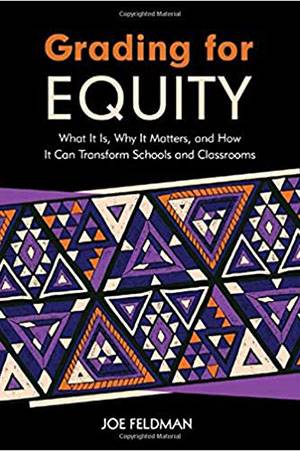
Grading for Equity by Joe Feldman
Adeline Borti, PhD
Hall, D. E. (2002). The academic self: An owner's manual. Ohio State University Press.
Reading this book during the summer was thought-provoking. This self-help book has set me on continuous self-reflexivity as I explore my self-identity in the academy. In Hall's book, reflection is a state of mind that examines one's actions and inactions, whereas reflexivity goes beyond reflection to include self-examination within a wider context and leads to identifying strategies that result in progress.
Hall has challenged me to recognize the need to examine the professorial "self" as a text, emphasizing self-identity and self-reflexivity, which are critical to my growth and success. Thus, just as we examine, analyze, appreciate, and critique literary text, we should do the same to ourselves even as we consider ourselves as texts in the academy. Hall calls on academics to pay attention to self-identity and self-reflexivity as they help us appreciate why and how we work. The author also states that self-reflexivity leads to the promotion of self-development and collegiality.
I appreciate the author's statement that "self-reflexivity entails the seeing of one's life as a project always in the making." (p. 3). Yes, a project in progress mentality promotes agency that enables improvement. In addition to the personal benefit of self-reflexivity, Hall posits that "professional self-reflexivity can allow us to identify and gain a perspective on the destructive forces at work in our drives for "success." (p. 12). Thus, in our thrive for success, we should be cognizant of possible destructive forces and find ways to overcome or address them. With the call for self-reflexivity, agency, and growth, comes the urgency to meet standards and prove one's competence. Amid this call, the author recommended honesty, patience, and being well organized as key to achieving our goal. Among these virtues, I think patience is one that we struggle with as individuals in the academy. The question for us to ponder is how patient are we with ourselves and others even as we embark on this journey that requires consistent learning, unlearning, and relearning? To what degree do we extend grace to ourselves and others on this demanding and rewarding journey?
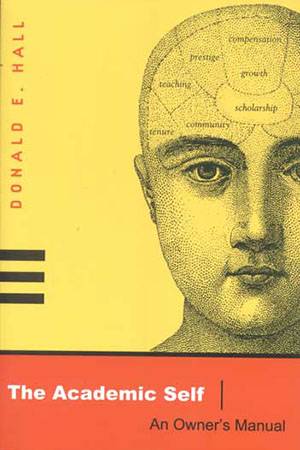
The Academic Self: an Owner's Manual by D.E. Hall
Brian Deyo, PhD
In Fall 2020 and Winter 2021 I experienced the privilege of reading, thinking about, and discussing Christina Sharpe’s In the Wake: On Blackness and Being with colleagues in an FLC (Faculty Learning Community) titled “Making Waves in the African Diaspora: Part Two,” led by Professor Sherry Johnson. I remember Sherry saying that doing the FLC felt like a form of much-needed self-care during a moment when our energies—and capacities for thoughtfulness and attentiveness—were at risk of being overwhelmed by the frenetic pace of life and work amidst a pandemic with no apparent end in sight.
Sharpe’s book on the legacies of European colonialism and imperialism, on racialized capitalism, and the “afterlife of slavery” is, at first blush, singularly difficult to describe, especially in a short review. I’ll start by simply saying that, for me, the existential, social, and historical value of the book has been—and continues to be—immense. Much of the value of the book is captured by Sharpe’s notion of “wake work,” which is by no means prescriptive or reducible to a scholarly method or set of rigid academic protocols. Rather, the book has an uncanny way of compelling thought on the largely unspoken ways in which dominant cultures of academic scholarship militate against our individual and collective capacities to open ourselves, our scholarship, and our teaching to a range of affective intensities Sharpe implies to be foundational to the work of imagining the past. For Sharpe, imagining the past is difficult and agonizing work, and art, literature in particular, can give us the crucial assist we need to imaginatively reckon with the histories of slavery. I would add that “wake work,” inasmuch as it strenuously engages the specific gravity of slavery—as well as the ways the institution weighs on the present—has the potential to pry open a utopian space for thought, feeling, and action to flourish in a time that is riddled with uncertainty concerning our collective futures.
I strongly feel the work we did together in the FLC, led by Professor Johnson—with the help of Sharpe’s extraordinary book— is just the sort of work we need to cultivate at this moment. It has inspired and informed the work I do in my scholarship and teaching, the work I’m engaged with in the University Academic Senate and the AAUP, as well as the CLAS Visioning work we’ve been doing together recently. It has also inspired me to lead an FLC in Winter 2022 on Christopher Newfield’s extraordinary work in the emerging field of Critical University Studies, which will focus on his most recent book on the history of higher education in the United States, The Great Mistake: How We Wrecked Public Universities and How We Can Fix Them. In this FLC, I plan to introduce Newfield’s work in relation to Sharpe’s—as well as the work we initiated in the FLC led by Professor Johnson—to try and underscore how and why “wake work” might guide the work we collectively do as advocates, exponents, and practitioners of liberal education at GVSU.
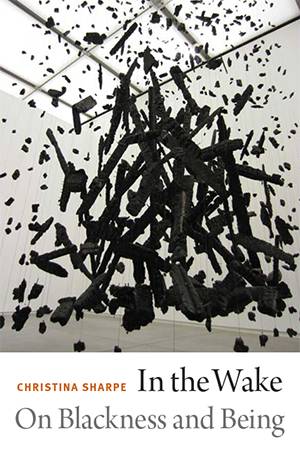
In the Wake: On Blackness and Being by Christina Sharpe
Revelations
Kathleen Blumreich, PhD
Anyone who has seen the film Best in Show is familiar with Winky, the crowd-pleasing Norwich terrier led to victory by double-left-footed Gerry Fleck (Eugene Levy). Norwich are sturdy little prick-eared dogs, known for their joie de vivre and desire for human companionship. We are fortunate to have two in our household: Eddie, who at fourteen enjoys short walks and long snoozes, and Lizzie, a boisterous five-year-old who revels in taking flying leaps from the porch into our backyard. When GVSU moved to ‘remote teaching and learning,’ Eddie and Lizzie were understandably confused. They were used to having one parent home much of the time, but suddenly I was there too, hushing and shushing and saying things like ‘Go lie down; I’ve got to teach now.’
I had included ‘Rules for Synchronous Online Classes’ in every syllabus, and for the most part, those were effective. After the first week of meetings, no one attended whilst propped up in bed or suddenly went dark. Students showed up on time, engaged with the literature we were reading. Occasionally, however, class discussions got interrupted by the squeaks of Lizzie’s favorite dragon toy or the sounds of Eddie scratching at my closed study door. And once or twice, an insistent, otherwise inconsolable and mildly age-impaired Eddie sat on my lap while I tried to navigate Zoom. Eventually, my students began to view the ‘kids’ as class mascots, asking about their health and activities, and sharing their own pet stories. Very brief appearances on screen ensued: of someone’s kitten determined to destroy a keyboard; of someone else’s rescue dog timidly looking into a laptop camera; of yet another person’s puppy angling for a treat. Despite our isolation, our anxiety that life would never return to ‘normal,’ we bonded in our makeshift, internet-dependent classrooms in part, I think, because the ‘No pets, please’ rule had gone straight out the window.
Those pet appearances were such a valuable part of our sustenance throughout our year and a half of synchronous online instruction, and though the return to campus, marked by teaching in a physical space where I can move about rather than be glued to my office chair, where can I write on an actual board with an actual marker, and where I can read students’ expressions in real time, is crucial to our recovery, I will also miss the extra time with the beasts, large and small, that provided much needed normalcy.

Eddie and Lizzie, snuggled in bed
Janet Navarro, PhD
Walking our beloved family dog, Serena, was a lovely experience … sometimes. Leashed and ready on good days, she turned predictably to the right as we left the driveway and tugged me forward with a frisky eagerness, stopping periodically to savor smells. I marveled at her olfactory curiosity; confident we had adopted a very smart dog. Other times, she was an annoyance. She pulled defiantly on the leash, stopped suddenly to sniff things, thus frustrating forward progress. On these days, I cursed her inability to heel; quite certain we had adopted a difficult dog.
One aggravating morning as she picked up her pace towards the park, I stopped in my tracks and laughed aloud. It hit me. SHE DID THE EXACT SAME THING EVERY TIME! She pulled the leash, stopped at familiar bushes, marked the same spots. I was the one who changed the expectation and the aspect. I projected positive or negative labels onto her. The words I used became mirrors shaping what I saw and how I felt. While before it had been easy to attribute my responses to her behaviors, I now understood that my view of Serena had little to do with her. It was actually a reflection of my emotional stew on any given day.
I should have known this. I teach it. In Choice Words (2004) Peter Johnston notes that teachers have to “make something out of what children say and do…(the teacher) imputes intentions and offers possible worlds, positions, and identities,” (p. 5). With a humble heart I now bring my experience with Serena to students. It’s not a big leap from this low-stakes example to understanding of the power we wield with words and the importance of engaging in an ongoing examination of implicit biases as well as our current state of mind when we enter a classroom full of children.

Serena, on a walk
Rob Rozema, PhD
Swimming has been my chief form of exercise for a few years now. I’m no Katie Ledecky, but I have learned how important recovery is to the sport. Swimmers recover in the days between workouts, in the moments between sets, and even during each stroke cycle. The recovery phase in freestyle, for instance, begins after the pull, as the arm leaves the water. The elbow is high, with fingers pointed downward. Recovery ends when the fingers enter the water, the arm following, replenished and ready again for pull. In this way, recovery is built into the process of swimming freestyle.
In his essay “On Fairy Stories,” J.R.R. Tolkien described how fantasy literature also provides recovery, among its other succors. Tolkien said that fantasy stories let us “clean our windows,” or gain a fresh view of what seemed dreary or superficial, knowing these familiar things anew. Tolkien wrote fantasy novels, but he believed that other forms of prose and verse could also offer recovery to the devoted reader. And so, as we collectively return from this pandemic, I am particularly grateful for the recovery provided by literature, a chance to “clean our windows” and start out again. This fall, we begin--elbow high, fingertips down, entering the water again.

Grand Traverse Bay, a favorite swimming spot of the author
English Department 2021 Awards
Grand Valley State University's English Department Awards Ceremony was not held as usual due to the COVID-19 pandemic. However, we still celebrated a number of students by honoring them with awards. Congratulations to all of the recipients!
The English Department Scholarships
The English Faculty Scholarship for New Majors - Azabeth Kish
The Robert L. Chamberlain Memorial Scholarship - Kurstin Frank; Rachel Radwan
The Dr. Andrew M.C. Brown Memorial Scholarship - Jessica Minder
The Gilbert R. & Patricia K. Davis Merit English Scholarship - Taryn Harwell
The English Department Awards
The Distinguished Performance in Applied Linguistics Minor Award - Sidra Elvey
The Distinguished Performance in the ESL Minors Award - Isabella Haskin
The Distinguished Performance in Elementary Language Arts Award - Alaina Wierenga
The Distinguished Performance in Secondary English Education Award - Lauren Maus
Distinguished Performance in Literature Award - Reka Hoving
University Awards for Excellence in a Discipline
University Award for Excellence in a Discipline: English BA Program - Elyse Greenwood
University Award for Excellence in a Discipline: English MA Program - Melissa Damico
University Award for Excellence in a Discipline: Applied Linguistics MA Program - Douglas Mooney
The English Department Oldenberg Writing Contest Winners
Fiction written by an GVSU undergraduate student
First Place - "November" by Elaina Smith
Second Place - "Buried in Water" by Hamlet Arnott
Third Place - "The Cottage" by Carol Miller
Honorable Mention - "Apartments Look the Same for Everybody" by Frankie Spring
Honorable Mention - "The Therapist" by Paige Siegrist
Honorable Mention - "What We Call It Now" by Jade Gustafson
Essay, poetry, fiction, or drama written by a GVSU graduate student
First Place - "Across Languages, With Love" by M. L. Dean
Second Place - "Wrens Make Prey Where Eagles Dare Not Perch" by Josh Aldrich
Third Place - "God is a woman" by Alexandra Dora
Personal essay written by a sophomore, junior, or senior
First Place - "The Red Barn Cosmovision" by Hannah Kelly
Second Place - "The Shadow that Time Left Behind" by Haley Tanis
Third Place - "Memorial for a Blessing" by Sarah Krishef
Honorable Mention - "This Body Forgives, Therefore, it is Feared" by Elaina Smith
Honorable Mention - "Put a Collar on It" by Nathaniel Lawson
Honorable Mention - "A Series of Fortunate Events: The English Major" by Sidra Elvey
Poetry written by any GVSU undergraduate student (small portfolio of 3-5 poems)
First Place - "Poetry Portfolio" by Frankie Spring
Second Place - "In the Dirt: A Poetry Portfolio" by Sidra Elvey
Third Place - "The Goldfinch Sings to Fabritius; Elegy for Mangoes; Home is a Haunted Place; Blueberries" by Katherine Gardella
Honorable Mention - "Stealing the Great Wall of China" by Amanda Pszczolkowski
Analytical or persuasive essay written by a sophomore, junior, or senior
First Place - "Lists in Toni Morrison's Beloved and Song of Solomon? An Unnecessary Necessity" by Haley Tanis
Second Place - "The Innovator or the Leader: A Queer Challenge to Hegemony in N.K. Jemisin's The Fifth Season" by Brittani Kooiker
Third Place - "A Deceptively Happy Ending: Deceit, Reality, and Consequences in A Midsummer Night's Dream" by Kinnedy Coleman
Honorable Mention - "Us, Them, and Terrance Hayes: How the Use of Persona Crates Distance in Hayes's Poetry" by Elaina Smith
Honorable Mention - "Eurocentrism in Disney: Outdated Character Design in Tanged (2010)" by Sarah Krishef
Personal, Analytical, or Persuasive Essay Written by a Freshman
First Place - "The Big Bang and Faith" by Vera Grix
Second Place - "Thoughts on a Winter Walk" by Alora Bowers
Third Place - "If These Walls Could Speak" by Rebekah Cole
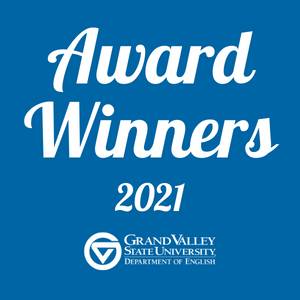
Faculty Tributes - Retired Faculty
We reached out to students and asked that they share somet thoughts regarding our English faculty that retired in 2020 and 2021. Below are their tributes. The faculty, staff and students of the English Department are grateful for the contributions, scholarship and friendship of all of these individuals. We wish them all the best in their post-GVSU adventures!
Dawn Evans
“She simply made the last two years of college the greatest experience of my life! She had very contagious energy, and even on your worst day, she knew how to make you smile. Thank you for everything Professor Dawn!”
Abe Swanson - CSAT Major, Special Education Major
*.*
“Dawn has been such an influential part of my time studying English and elementary education at Grand Valley. My favorite course I have ever taken in undergrad was teaching writing to elementary students with Dawn. Not only did Dawn teach me how to help my students improve their writing, she also taught me how to build positive learning relationships with them. I always looked forward to attending Dawn’s class and will be taking the knowledge she gave me into my future classroom one day. What a blessing Dawn was to me personally and to the Grand Valley community as a whole!”
Lilly Ruys - English Major, Elementary Education
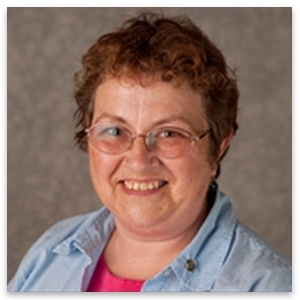
Dawn Evans, retired April 2021
Avis Hewitt
“I had Dr. Hewitt for ENG 225, which was the first section of American Literature. I thought she was an excellent professor. Not only was she kind, but she challenged me in my thinking. I would always look forward to going to her class to hear lectures on what we were reading because it always felt like it could apply to our own lives. When it came to writing, she had a unique approach to papers and assignments that made me appreciate that every single word counts.
Another thing that stuck with me months after taking her class was a quote she shared with us about literary criticism. I’m not sure the exact quote, but to paraphrase, she quoted someone who once said that the purpose of literary criticism is to deepen your enjoyment of literature. It was a simple thing, but it certainly made a big difference in how I approached scholarly analysis from then on. Instead of feeling ambivalent or even hostile towards criticism, I started to embrace it as a tool to enhance my appreciation for literature and that was a gift.
I wish nothing but the best for her in retirement.”
Jared Lancaster - English Major, Secondary Education
*.*
“Professor Hewitt was one of my favorite Professors that I had at GVSU! I took both her Early American Literature and Late American courses. The best part about her classes was how excited she got about every aspect of the subject. She was always willing to take the whole class period to discuss one aspect of the reading. I’ll always remember Professor Hewitt fondly!”
Reka Hoving - English Major, Language & Literature
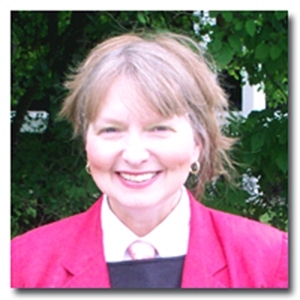
Avis Hewitt, retired summer 2020
Ben Lockerd
“I had Dr. Lockerd for ENG 313, which was British Lit: Shakespeare. I thought Dr. Lockerd was a great professor who always brought his A-game when it came to lecturing. During lectures, I felt like I learned so much in his class because we would get so microscopic when we critically engaged with the text. I think it's a testament to his ability as a professor that he really challenged me to reconsider how I felt about the play King Lear. But not only that, a year after I took his class, amidst a time of great suffering during the pandemic — I began to see myself reflecting on some of our lectures, and I happened to discover a newfound appreciation for the play. I think that the beauty of literature is seeing how it shapes your lives, especially in ways that are unexpected. Dr. Lockerd undoubtedly had a role in facilitating that for me.
I hope for nothing but the best in retirement.”
Jared Lancaster - English Major, Secondary Education
*.*
“Dr. Lockerd was, by far, my favorite professor. His manner of teaching was clear, informative, and his classes almost always fun. The only exception being during exams for which I was under-prepared.
Being his student was such a joy that I enrolled in his courses multiple times during my years at Grand Valley State University. Dr. Lockerd always made himself available to help when needed and would accept nothing but my best work -- which was an immense help in improving my skills.
I was sad when I learned Dr. Lockerd would be leaving GVSU because I knew how impactful he was for me and future students wouldn't have the same opportunity. However, I was glad to know he would have more time to enjoy the best things in life (like fly fishing for trout).
The memories I made while in his class are ones that are still brought up by me and my friends, who also had the joy of learning from him. No tribute can do him or his impact justice, so let me end by saying that Dr. Lockerd brought me nothing but joy and fruitful learning and that he has my eternal well-wishes.”
Charis Lunt - English Major, Language & Literature, '20
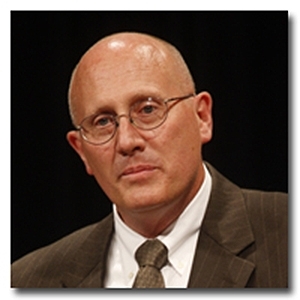
Ben Lockerd, retired April 2020
Jim Persoon
“I especially enjoyed his class because he didn’t approach the course like he was the professor and we were all students; he made it feel like a conversational book club meeting and I really felt like I was known in his class. It was one of the most important courses I’ve ever taken and I’m very grateful that I was lucky enough to have class with Dr. Persoon.”
Holly Bihlman - English Major, Language & Literature
*.*
“For my first ever college English course being completely online, Dr. Persoon certainly made it one that was engaging and interesting. The passion that he had when it came to the English language and the telling of stories was truly unique and something that you don’t always see anymore. I hope that one day I can care as much about what I am teaching as well as who I am teaching it to as much as Dr. Persoon did. You will truly be missed and I hope you enjoy your retirement!”
Lauren Methner - English Major, Elementary Education
*.*
“Dr. Persoon was my first professor in the literature grad program, and after that semester I never passed up another chance to study with him. What I most appreciated about his classes is that they always felt like a conversation. Class rarely involved the professor up front talking at the students; instead, Dr. Persoon took the time to rearrange the classroom every week so we could sit in a circle and talk to each other. Though he is certainly a font of knowledge about everything from Sylvia Plath to Thomas Hardy to the poetry of World War I, during class he acted more as a facilitator of conversation, chiming in with interesting tidbits or connections to other texts, but primarily allowing students to do our own thinking and exploring together. His simple method of asking us to write the titles of poems we wanted to talk about on the whiteboard provided hours of engaging discussion. This student-centered, community-centered approach continued when he invited us to his home for one class period to eat burgers on the back deck before watching Tess of the D'Urbervilles together in his cozy, book-lined study. Even the class he taught fully on Zoom last summer was engaging, rarely plagued by those moments of awkward technological silence. Dr. Persoon gives credence to all forms of student writing, appreciates texts like graphic novels, films, and television just as much as traditional novels and poetry, and sends off his students with encouraging and constructive feedback on all assignments—something that, as a fellow teacher, I know is a real feat. I will miss his relaxed approach to teaching and learning, but I hope I'm right to imagine him on his back deck and in that study, reading poetry and thinking fondly of all the students he has reached in his many years of teaching.”
Abby Zwart - Master of Arts in English

Jim Persoon, retired December 2020
Ivo Soljan
“I thoroughly enjoyed my time with Dr. Soljan during his Literatures In English lecture. He always speaks so lovingly of his family, hobbies, and interests. I could tell that he enjoyed his line of work, it showed in his positive attitude and kind smiles every day. He is definitely a Professor I have discussed fondly with my peers. It was my first year at GVSU when we were thrown into online classes and extreme social distancing, but Dr Soljan continued to teach us to his very best ability and motivated us to keep our heads up and I greatly appreciate it. Thank you, Dr Soljan, I wish you the best wherever you may go!”
Holly Boyatt - Studio Art Major
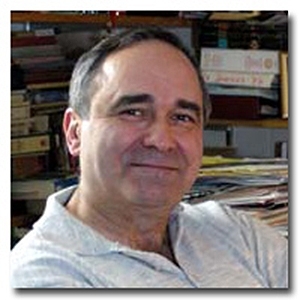
Ivo Soljan, retired December 2020
Mike Webster
“I hope I can stay as passionate about my career for as long as professor Webster was about his. He is the kind of person that helps you without expecting anything in return.”
Nicholas Postma - Psychology Major
*.*
“Dr. Webster’s teaching provides that rare combination of infectious enthusiasm for the course material and an immense amount of insight to share on his speciality. As a result, even areas of study not inherently fascinating to me became such!”
Anne Oxendine - Master of Art in English Major
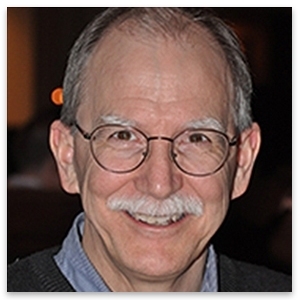
Mike Webster, retired April 2021
Proust Questionnaire
Developed by writer Marcel Proust, the Proust Questionnaire was once considered a parlor game by those in the Victorian era. Today, it's often used by modern interviewers.
The English Department decided to pose these questions to a number of our students. The following answers were provided by Nikki Vega. We hope you enjoy this introspective, yet captivating close to this edition of our newsletter.
What is your idea of perfect happiness?
My idea of perfect happiness would be to be with my family at one of the great lakes. A gentle wind would be making the leaves of the birch twinkle. I would be able to enjoy the sunshine (I have an intense photosensitivity).
What is your greatest fear?
My greatest fear is that those around me would be suffering and I would be unable to help them.
What is the trait you most deplore in yourself?
I am very shy
What is the trait you most deplore in others?
I do not like when people hurt or otherwise take advantage of others, especially vulnerable populations.
What living person do you most admire?
I cannot think of one person I most admire. I admire a spirit of humanity that works and strives to do what is right and that carries the passion and art that exists through time. I can see these qualities in people that sacrifice for others, that teach others, and that love in a pure way.
What is your greatest extravagance?
My children and their travel sports.
What is your current state of mind?
Relaxed.
What do you consider the most overrated virtue?
Hedonism is very overrated.
On what occasion do you lie?
To save another’s life or to bring joy or avoid suffering to children.
Which living person do you most despise?
I do not despise any one person, but those who believe they are better than or more deserving than others are frustrating.
What is the quality you most like in a person?
Integrity.
Which words or phrases do you most overuse?
“Cool.”
What or who is the greatest love of your life?
I am deeply in love with my husband, but think my children are absolutely amazing. I have so much love for them. They bring me so much joy.
When and where are you happiest?
I am happiest with my family in a remote wooded area, either near water or mountains.
Which talent would you most like to have?
I would love to be able to fly and heal people, but within the confines of reality, I would love to be a good poet.
If you could change one thing about yourself, what would it be?
I would be free of my health conditions.
What do you consider your greatest achievement?
I have worked diligently for almost two decades to be a good role model and nurturing parent. I believe I have done well in this pursuit. I am also very proud of dabbling in fiction novels.
If you were to die and come back as a person or a thing, what would it be?
If I were to die and come back as something else I would come back as a birch tree. My branches would provide haven for many creatures. I would feel the strong legs of birds landing and the chittering of excited chipmunks. I would hear the wind whistling through my leaves. I would feel the soft cool sand, wet from a nearby river on my roots. I would be content with the company of the nearby trees. I would thrill in the changing of colors in the fall and sprouting of new leaves in the spring. If I were lucky, children would play in the comfort of my shade, lovers would carve their names in my bark, and my grandchildren would lean against my trunk and read.
Where would you most like to live?
In a fairytale place that ranges from 40-78 degrees, is often cloudy, and never humid. In the Army I have traveled a lot and discovered that wherever my loved ones are is my home.
What is your most treasured possession?
I have a large collection of family history and pictures. These are invaluable. However, I do have an obsession about my books. I am very particular and protective of them. The knowledge and beauty they possess are invaluable.
What do you regard as the lowest depth of misery?
Being unloved or never knowing love. I am fortunate enough to have never felt this, but I imagine it would be horrible.
What is your favorite occupation?
I love to try to figure out mental puzzles and find hidden meanings. I love ciphers of all sorts, especially when I find them in literature.
What is your most marked characteristic?
I am very protective of others.
What do you most value in your friends?
Integrity and good character.
Who are your favorite writers?
I love writers with depth and those who have great heroes. My favorites are TS Eliot and Ted Hughes.
Who is your hero of fiction?
A combination of John Galt and Frodo Baggins.
Which historical figure do you most identify with?
This is hard to answer. An unknown searcher of truth who lives quietly.
What is it that you most dislike?
Sudden changes and unpredictability.
What is your greatest regret?
I regret not being able to help my brothers and sisters who went to war without me.
How would you like to die?
I would like to die an old lady, feeling accomplished and loved, in my own warm, comfortable bed, next to my husband, with my children and grandchildren around.
What is your motto?
Nil Desperandum.
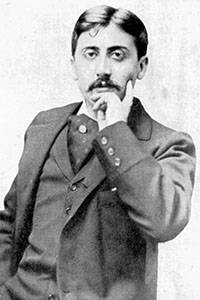
Marcel Proust
Follow us on Social Media for the latest happenings in the English Department!
We're on Instagram!
The GVSU English Department as recently joined Instagram! Be sure to follow us there for all the latest news and updates from the department.
Find us at @gvsuenglish.
English Matters
Published by the GVSU English Department
December 2021
Dr. Sherry Johnson, Editor
Jennie Reed, Assistant Editor
Keith Magnusson, Communications Graduate Assistant
Anne Oxendine, Communications Graduate Assistant


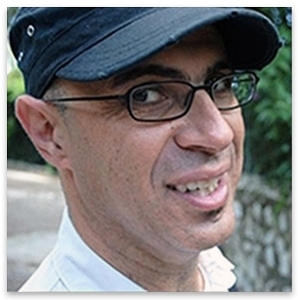

[1530279055].jpg)
